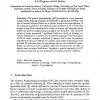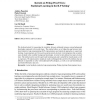42 search results - page 5 / 9 » Condensed Representations for Inductive Logic Programming |
142
Voted
AIIA
2005
Springer
15 years 7 months ago
2005
Springer
Machine Learning systems are often distinguished according to the kind of representation they use, which can be either propositional or first-order logic. The framework working wi...
128
Voted
EVOW
1994
Springer
15 years 5 months ago
1994
Springer
The genetic programming (GP) paradigm is a new approach to inductively forming programs that describe a particular problem. The use of natural selection based on a fitness ]unction...
109
Voted
JMLR
2006
15 years 1 months ago
2006
We develop kernels for measuring the similarity between relational instances using background knowledge expressed in first-order logic. The method allows us to bridge the gap betw...
166
Voted
IDA
2005
Springer
15 years 7 months ago
2005
Springer
Abstract. This paper introduces Higher-Order Bayesian Networks, a probabilistic reasoning formalism which combines the efficient reasoning mechanisms of Bayesian Networks with the...
ILP
1998
Springer
15 years 6 months ago
1998
Springer
In this paper we argue that the use of a language with a type system, together with higher-order facilities and functions, provides a suitable basis for knowledge representation in...


